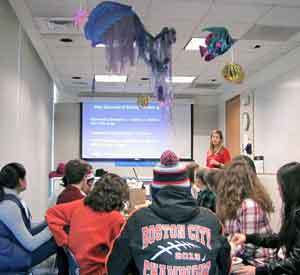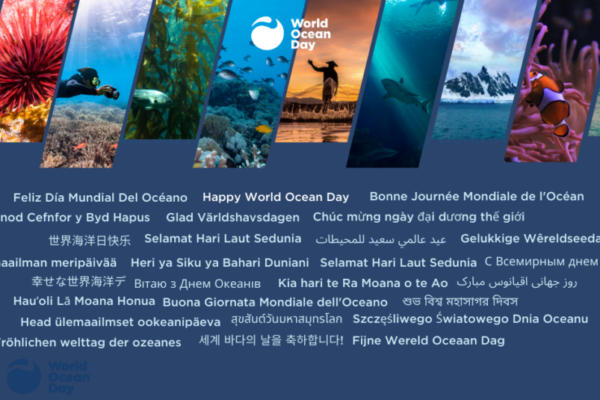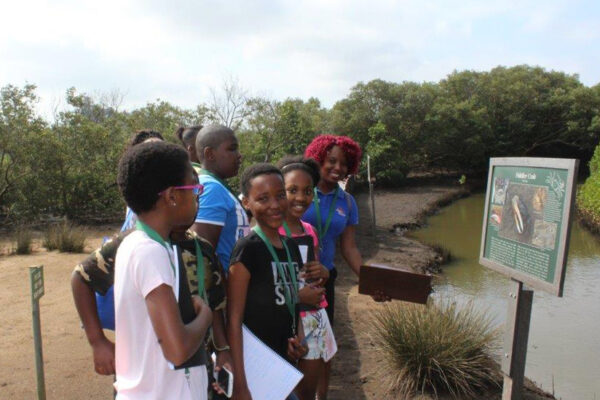This guest post by Sylvia Scharf of New England Aquarium is the second in a 3-part series on their Innovative Solutions Grants+ project, which investigates how teen ambassadors can make a difference for their city’s green future. The previous post presented the project, this is an update on what's happened since.
How do we engage youth in talking about big topics that really matter in ways that are empowering and interesting? This year, the New England Aquarium’s ClimaTeens took on the challenge of talking about climate change.
The group was formed from interested teens who already had been involved in Aquarium programs as volunteers, interns, and members of our service-learning program. The initial goal was for the teens to lead a training day for their peers. But given the energy of participants and staff members, and with support from The Ocean Project’s Innovative Solutions Grants + Program, we ramped up our plans and set a new goal of empowering the teens to inspire others to take action.
Our first step was to ensure that the teens felt confident when communicating about climate change. During the fall and early winter, the group spent many hours building their understanding of core climate science content and communication theory. Early this spring they began developing presentations to share.
ClimaTeens in action
When a surprise call came from the office of EPA Administrator, the ClimaTeens were ready.
They presented as part of an Earth Day press event with EPA Administrator Gina McCarthy and Energy Secretary Ernest Moniz, as well as Massachusetts Senator Ed Markey, and Boston Mayor Marty Walsh. From that high note, ClimaTeens engaged audiences at several meetings and conferences including the Youth Climate Action Summit at MIT, the Massachusetts Environmental Education Society annual conference, a Career Pathways workshop at the Aquarium, and the Aquarium’s World Oceans Day celebration. Each presentation featured different ClimaTeen presenters, bringing individual voices to the fore.
At the end of the school year, we asked the ClimaTeens to reflect back on their growth, and what they might look for in the future. Here are some of their reflections, showing that they had become much more confident.
- “Before, I was under the impression that climate change was too “big and scary” to tackle on my own, or even with a group. However, now after having been through the ClimaTEENs program, I can say with confidence climate change is a solvable problem (if we do take action).” (Grace C., 17)
- “I feel like the reason teens are valuable in the fight against human caused climate change is that we lack the limits that adults do in the terms of problem solving.” (Grace L., 15)
- “My whole family has changed because of my relationship with the aquarium. All of our decisions on purchases and transportation have definitely changed.” (Vida, 17)
These reflections also indicate how important the community has become to participants. In working with teens in this kind of setting, social bonding is as important as the science learning. Even though our meetings were only two hours, once a month, the first 15-30 minutes of each meeting was devoted to pizza, chatting, checking in, and joking around. As an educator, the temptation to ‘make every second count’ can work against the importance of teens as social learners. Meetings were sometimes chaotic and full of chatter – but we managed to get amazing things done through it all. As one of the ClimaTeens said, “We could be a really big deal.”
Looking forward - asking for action
With that success, we’re gearing up for our second step, and we’re upping the ante with a goal of inspiring action! This session’s ClimaTeens - which will include some veterans as well as some new recruits - will have multiple opportunities to put the strategic framing and communication skills they gain into practice – through Blue Discovery Family Days at the Aquarium.
And to test their impact, the teens this fall will survey visitors to see if those who heard them were indeed more likely to get the connection between climate change and ocean health, feel empowered to make a difference, and express a willingness to take one or more of the following actions:
- Wash clothing in cold water and/or let it air dry
- Have an energy expert conduct a free home energy audit for their house or apartment (through an already established city program)
- Join a community-based effort, such as Greenovate Boston or the New England Aquarium's live blue Ambassadors
Stay tuned for the results!
-- Sylvia Scharf, Senior Program Educator at New England Aquarium




